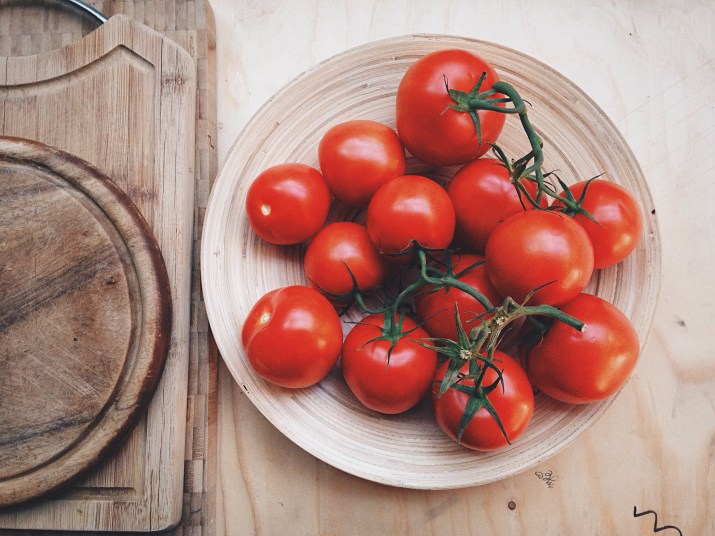Eat More Lycopene to Protect Your Eyes, Brain, and Skin from Age-Related Damage
Just in time for tomato season!

As we get older, there are certain nutrients that we should incorporate more of in our diets. As our eyes get a little weaker, our skin gets more sensitive, and our brains start to lose their sharpness, it’s helpful to supplement with the right foods. And once we tell you about how lycopene benefits the aging body, you’ll want to throw a few more tomatoes on that salad.
Lycopene is a phytonutrient (fancy word for plant nutrient) that gives a lot of our favorite pink and red foods like tomatoes, guava, watermelon, and pink grapefruit their natural color. It has potent antioxidant properties that make it extremely beneficial for eye, brain, and heart health — all while helping to protect your body from disease.
Lycopene Benefits for Your Vision
Have you been squinting a little more than usual? As time goes along, we can naturally start to lose our vision — a condition called age-related macular degeneration. On top of aging, this condition is known to be caused by excess free-radical damage to the eyes.
Lycopene, as an antioxidant, helps to combat this free-radical damage and preserve your vision. One study found that lycopene helped reduce the effects of oxidative stress on lenses affected with cataracts, while another review suggested that lycopene is an integral nutrient to incorporate in the prevention of age-related eye conditions.
Lycopene for Your Brain
Just as we need to take more care of our eyes over time, we should also be taking more care of our brains. In the US, it’s estimated that more than five million people are living with Alzheimer’s disease. Conditions like Alzheimer’s dementia are also characterized by oxidative damage to the brain, and lycopene may help to protect you from it as well.
One specific sign of Alzheimer’s is the accumulation of beta-amyloid plaques in the brain. One study found that lycopene helped to reduce oxidative damage associated with beta-amyloid plaque accumulation in the brain, making it a powerful brain protector. Researchers from another study also found that lycopene protected Alzheimer’s-affected brain cells from oxidative stress. Getting more lycopene in your diet could, therefore, help prevent the onset of conditions like dementia.
Lycopene and Skin Damage
As you might already know, our skin becomes more sensitive to things like sun damage as we get older. Lycopene, however, is a nutrient that works to protect your skin from the inside out.
While it’s definitely not considered a replacement for using sunscreen, studies have shown that lycopene can protect your skin from harmful UV rays. In one study, subjects were exposed to UV rays before and after taking either 16 milligrams of lycopene derived from tomato paste or a placebo. Those who took the tomato paste showed much less severe skin reactions to the UV rays compared to the placebo group. A similar study found that taking between eight and 16 milligrams of lycopene (from food or supplements) resulted in a 40 to 50 percent reduction in sun damage to the skin. That’s pretty impressive!
Other Lycopene Benefits
On top of all this, research has shown that lycopene may improve other aspects of your health, too. Like many antioxidants, lycopene could boost your heart health by reducing oxidative damage to your heart and arteries, and helping to lower cholesterol levels in your blood. One particular study found that diets rich in lycopene were associated with a 17 to 26 percent lower risk of dying prematurely from heart disease and metabolic syndrome!
And again thanks to its powerful antioxidant powers, lycopene has been found to help fight certain cancers. Studies have shown that it helped slow the progression of tumor growth in breast cancer tissue, while other research showed that it prevented kidney cancer cells from growing and multiplying.
Where to Get Your Lycopene
Now that you know all about the lycopene benefits, let’s talk about where you can get it. You can purchase a lycopene supplement like this one from Puritan’s Pride ($6.86, Amazon), but as always, get your doctors OK before starting any new supplement regimen.
Aside from supplements, a great way to get more lycopene into your days is to add it to your diet with foods. As mentioned, fruits and vegetables that are pink and red in color often contain lycopene. The best food sources of lycopene are tomatoes (sun-died tomatoes contain the most, tomato puree comes in second, while fresh tomatoes contain the least), guava, watermelon, papaya, and pink grapefruit. Try adding in a few servings of these delicious foods each day, and you can be confident you’re doing great things for your body.
First For Women aims to feature only the best products and services. We update when possible, but deals expire and prices can change. If you buy something via one of our links, we may earn a commission. Questions? Reach us at shop@firstforwomen.com













